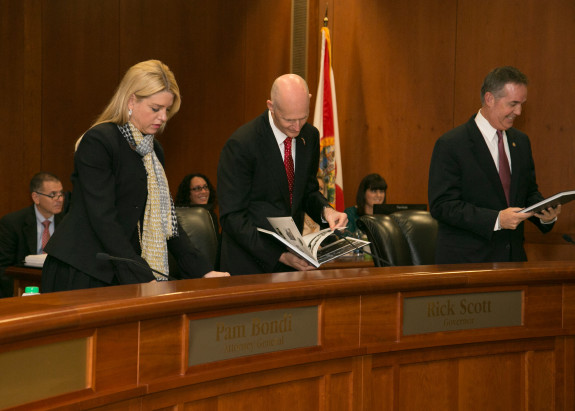
State Attorney Willie Meggs has been asked to launch and investigation into whether Gov. Rick Scott and his cabinet officials violated the Sunshine law by discussing privately the ouster of former FDLE Commissioner Gerald Bailey. (Photo by Sara Brockmann via FLGov.com)
By Ashley Lopez
Florida Center for Investigative Reporting
A Florida lawyer has asked a state attorney to conduct a criminal investigation into whether Gov. Rick Scott and members of the Florida Cabinet and staff violated the state’s Sunshine law.
At question is whether there were conversations regarding the ousting of Former Florida Department of Law Enforcement Commissioner Gerald Bailey outside of a public meeting.
Several weeks ago, Scott’s staff asked Bailey to resign or retire. Bailey spoke out when Scott told reporters he resigned on his own, and since then there has been a lot of media attention surrounding what happened leading up to the resignation.
Matthew D. Weidner, a lawyer in St. Petersburg, wants Leon County State Attorney Willie Meggs to investigate whether any of that happened out of compliance with the state’s open meetings and public records laws.
In a letter to Meggs, Weidner wrote:
This request is based on the statement of Gerald Bailey, former head of the Florida Department of Law Enforcement (FDLE), widely reported in the press, who indicated that “he was forced out by Scott and was told by General [Counsel] Pete Antonacci that he had the concurrence of all three Cabinet members.”
As you are well aware, the Government in the Sunshine Law applies to “any board or commission of any state agency or authority or of any agency or authority of any county, municipal corporation, or political subdivision.” The statute thus applies to public collegial bodies within this state, at the local as well as state level. All governmental entities in Florida are subject to the requirements of the Sunshine Law unless specifically exempted. The Governor and Cabinet are subject to the Sunshine Law when sitting in their capacity as a board created by the Legislature or whose powers are prescribed by the Legislature, such as FDLE.
Any conversations between and among the Governor and members of the Cabinet, directly or through conduits, regarding the replacement of the head of the FDLE violate the Government in the Sunshine Law. The Sunshine Law is applicable to meetings between a board member and an individual who is not a board member when that individual is being used as a liaison between, or to conduct a de facto meeting of board members.
Meggs has opposed a third-party inquiry into what happened. He told reporters the allegations Bailey was improperly forced out are “much ado about nothing” and that Bailey’s complaints against Scott are “nothing more than a squabble,” The Tampa Bay Times/Miami Herald previously reported.
According to the Times/Herald, Meggs said he wouldn’t be getting involved:
“The Cabinet members are big boys and girls,” Meggs said Thursday. “They can do whatever they want. They all have investigators. Go investigate. If they don’t, shut up. It’s that simple.”
Meggs said he won’t even consider investigating until he receives a criminal complaint from Bailey himself.
“If Gerald Bailey wants to come into the office and file a complaint that someone has violated the law, then I’ll take a look at it,” Meggs said. “I generally don’t take complaints from the media. If there is something, we need to handle it in the proper fashion.”
But Meggs said one of the first questions he would ask is why Bailey only made the allegations recently and not when he observed the incidents taking place.
“I would be extremely disappointed if he came in to tell me about a crime he knew about when he was commissioner,” Meggs said.
However, in his letter, Weidner took Meggs to task for dismissing the possibility of an investigation:
Statements attributed to you in the press indicated that you won’t even consider opening an investigation until you receive a criminal complaint from Mr. Bailey himself. But Mr. Bailey is not the real party in interest here. As you know, the requirements articulated within Florida’s Sunshine laws provide critical protections which inure to every citizen and resident of this state. When these laws are violated, these citizens and residents are the victims of those violations. Accordingly, the real parties in interest in these instances of potential Sunshine law violations are the citizens of the State of Florida, whom you represent as State Attorney. At issue is the constitutional and statutory right of every citizen of the State of Florida to have open and noticed public meetings when official acts are to be taken or at which public business of such body is to be transacted or discussed. Under the facts before us, I respectfully assert you have a duty to initiate an investigation on behalf of the people you took an oath to serve.
At the end of his letter, Weidner told Meggs to recuse himself if his unwillingness to pursue an investigation was due to a lack of impartiality. He said Scott should then appoint another state attorney to investigate.
